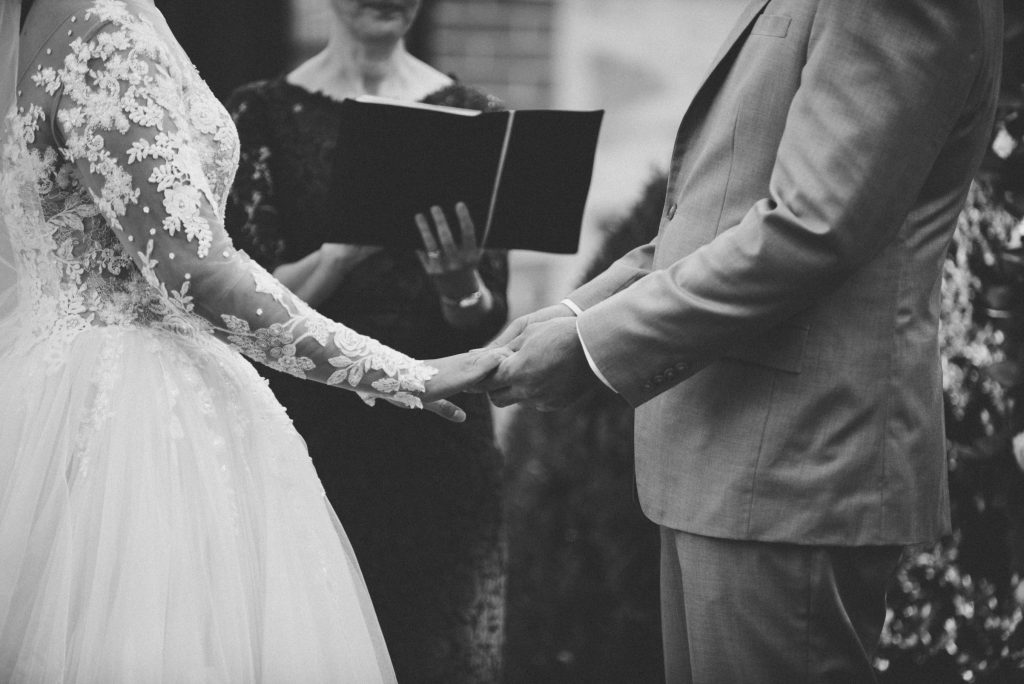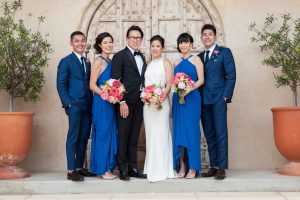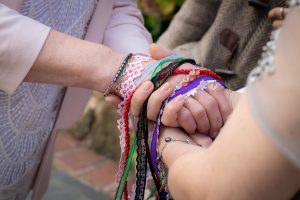Commonly asked questions
Lucinda and Sam’s Marriage celebration
What do I need to do first?
Book the Celebrant as soon as you know the date, time and location as there are limits to the number of weekends in the year, particularly the high season in South Australia (September to the end of May) particularly November and March. (week-days also available).
How much notice do you need?
The Marriage Act requires at least one calendar months’ notice to lodge your notice of intended marriage form with the celebrant of your choice.
How do I lodge an Intention to Marry Notice?
Fill out the ‘notice of intended marriage form’ at your first appointment with your celebrant no less than one month before your Marriage or up to 18 months beforehand. This can also be sent to you by email or post. You will need to give your celebrant evidence of date and place of birth, identity in the form of your passport or birth certificate and provide a divorce or death certificate if previously married. Your celebrant may also ask you to complete a statutory declaration to support your evidence.
If residing overseas we can organise all that is required by email, phone and post. The law requires that I view all original documents before the wedding ceremony. The notice may be completed and witnessed outside Australia if required.
How do I sign the register and marriage certificate?
Your maiden name – usual signature.
How long does the ceremony last?
An average ceremony is 20 to 30 minutes.
Witnesses: A marriage shall not be solemnised unless at least two persons who are over the age of 18 years are present as witnesses.
Marriage equality: On 9 December 2017, the Marriage Amendment (Definition and Religious Freedoms) Act 2017 commenced. The Act changed the definition of marriage and provides for marriage equality in Australia. The right to marry in Australia is no longer determined by sex or gender.
You don’t have to be an Australian citizen or a permanent resident of Australia to legally marry here. You can find marriage visa information on the Department of Home Affairs website, if you hope to live in Australia after your marriage.
Michelle and Gerald’s Marriage Ceremony at The Lane Vineyard, Woodside
In Australia, marriage is regulated by the Marriage Act 1961, which sets out the process for getting married and the legal requirements of a valid marriage.
1. A completed notice of Intended marriage form must be given to your celebrant at least one month (and up to 18 months) before the wedding.
2. You and your partner must provide your celebrant with evidence of your date and place of birth, identity and the end of any previous marriages
3. You must both sign the ‘Declaration of no legal impediment to marriage’. By signing the Declaration, you declare that you believe that you are of marriageable age, and that there is no legal impediment to your marriage.
4. On your wedding day, your celebrant will solemnise your marriage. Your celebrant will then ask you, your partner and your witnesses to sign up to three marriage certificates
5. After your wedding, your marriage celebrant will register the marriage with the Registry of Births, Deaths and Marriages in the State or Territory where your marriage took place.
Australian citizen and a foreign citizen marriage.
Contact your embassy for legal advice.
Contact The Department of Home Affairs or a registered migration agent.
Details of registered agents can be found on the Migration Agents Registration Authority website.
Some overseas countries do not recognise a marriage entered into in Australia as valid, unless other requirements, such as the prior granting of permission from that country’s embassy, are fulfilled. This can have implications for foreign nationals who intend to return to their country following a marriage. In cases where a marriage involves an Australian citizen and a foreign citizen. Contact your embassy for legal advice.
Jakob and Natalie’s Marriage Celebration at Three Gum’s Bistro, Hahndorf
After you are married : On the day of your wedding, you will sign three marriage certificates. Each certificate should be signed by you, your celebrant and two witnesses. Your celebrant will give you one of the certificates as a record of your marriage.
Your celebrant must provide your marriage paperwork to the registry of births, deaths and marriages in the state or territory in which the marriage took place within 14 days.
The certificate issued by the registry of births, deaths and marriages is required for many official purposes. You should apply for a copy of this certificate from the registry after your wedding through the relevant registry of births, deaths and marriages online porthole.
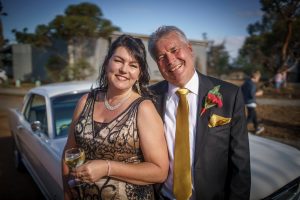 Julie and Pete’s Marriage Celebration at Sedan
Julie and Pete’s Marriage Celebration at Sedan
Some Advice: Choosing your celebrant:
- Choosing your celebrant is an investment in the experience and memories of your Wedding, this person represents you on the day. .
- Ask to see referrals from other couples and examples of ceremonies .
- Will the celebrant be officiating at multiple weddings on the day?
- How much experience does the celebrant bring to managing the occasion with confidence and sensitivity. Are they a fluent presenter to lead your ceremony in an engaging, elegant and joyful manner.
- Take your time to choose your celebrant, to find your right fit, there are no re-runs for one of the most sensitive, memorable moments of your life.
- Check the Celebrant has a Professional PA system as wind outdoors can make it difficult to hear.
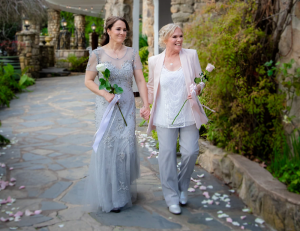 Caroline and Margaret’s Marriage Celebration at The Manor, Basket Range
Caroline and Margaret’s Marriage Celebration at The Manor, Basket Range
Strengthening your marriage
Before marriage: marriage education
Solid relationships set you up to meet the changes and challenges of life. It is important to develop good communication and sound relationship skills early, so that you can fall back on these skills during difficult times. Pre-marriage education prepares couples for marriage by providing skills and information to build lifelong marriages. Courses are also available to explore the added dimension and complexity brought to a marriage by children from a previous relationship.
Contact: Relationships Australia, Relationship Councillors
This information is provided pursuant to subsection 42(5A) of the Marriage Act 1961
Marriage in Australia Important things you need to know
Health and welfare benefits
If you receive health or welfare benefits, you will need to contact the relevant agencies to advise them that you have married. These agencies will advise you if your benefits will change. You may lose benefits and even be penalised if you fail to tell them you have married within a reasonable time after the wedding.
Changing your name
Any person who marries may choose to take their spouse’s surname. You are not legally required to take your spouse’s surname once you are married. If you wish to take your spouse’s surname, you must obtain a certificate of marriage issued by your state or territory Registry of Births, Deaths and Marriages. This is usually sufficient evidence to have your personal documentation (eg. driver’s licence) changed to your married surname. The certificate you received on your wedding day is ceremonial and will not meet the identity requirements of many government agencies, such as the passport office.
Citizenship
If you marry an Australian citizen, you do not have an automatic right to Australian citizenship. You will still need to apply for citizenship and satisfy the eligibility criteria. You can obtain further information from the Department of Home Affairs website at www.homeaffairs.gov.au.
Making a will
Marriage will invalidate any previous wills unless your will clearly shows you were planning this marriage when you made it. It is important that you make a new will when your personal circumstances change. This ensures that you have a valid will that gives effect to your intentions about how you want your assets to be distributed in the event of your death. A solicitor can help you make or change a will.
Taxation after marriage
When you marry, the amount of taxation you pay may change. It is advisable to contact the Australian Taxation Office, a tax agent or an accountant before marriage to discuss any tax implications
Payment: Money Order, cash, electronic funds transfer.
-
- Please inquire for packages.
- Registry service (maximum of 6 people including the couple)
- Popular trends: Home or family/ friends garden wedding. Some couples choose to circulate with friends and family before the ceremony begins, then come together at the designated time to begin the proceedings rather than the traditional processional/giving away.
- Appointments: Flexible meeting times, call for a no-obligation appointment.
- I normally wear a formal dress or suit, however I have more relaxed appropriate clothing to suit your occasion.
Diana is a full time professional Celebrant appointed by the Australian Federal Attorney General. She brings over fourteen years invaluable experience to design, choreograph and deliver your marriage ceremony in an elegant, fun and relaxed manner and follow all Australian law requirements in Marriage.
Committed to the pursuit of excellence, code of ethics, cultural sensitivity and annual ongoing professional development.
